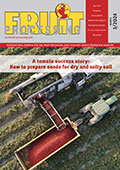The intense cold observed in São Paulo State (SP) in late July hit the orchards located in the citrus belt, with frosts registered in some areas. This scenario increased agents’ concerns about both orange production in the current season and the vitality of trees in the coming season – it is worth to mention that agents were already worried about these factors because of the lack of rains this year.
These agents are concerned about the vitality of the trees in all the groves hit by the recent frosts, since they are nearing the period of flower induction already debilitated by the lower rainfall in the last two years. However, it is worth to mention that it is still early to assess the damages caused by the bad weather, majorly the effects on the volume to be harvested next season.
Considering the current season (2021/22), the quality of the oranges on tree is expected to decrease, since some of the fruits affected by the frosts in late June/early July are dry and crystalised in the inside – these are undesired traits for both the in natura and the industrial segments, since the oranges have almost no juice in that condition. Besides, fruits dropped down in the areas that were already debilitated by the drought.
As regards next season (2022/23), the younger trees (which are currently sprouting) are expected to be the most damaged by the frosts. In the irrigated groves where flowering was anticipated, the effects of the bad weather are a concern too, since flowers may have been burned, as well as small fruits. It is worth to highlight that the recent frosts were not homogeneous, and it is still impossible to affirm that the volume to be produced in 2022/23 will be affected.
PONKAN TANGERINE – Although ponkan tangerine is more sensitive to temperature swings, the volume to be harvested in SP is not forecast to be affected, since the harvesting is practically over. On the other hand, in Minas Gerais, the volume to be harvested is higher, and there may be negative effects on the quality of the fruits.
TAHITI LIME – For this variety, although damages have not been assessed yet, concerns are higher, since tahiti lime is very sensitive to weather changes. Besides, differently from oranges, whose groves are mostly in the ripening stage or being harvested, development is at different stages among the regions with tahiti lime, with some of them in the flowering stage. According to Cepea collaborators, the intense cold caused the drop of some small fruitlets, flower buds and flowers.









